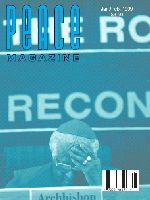
Peace Magazine Jan-Feb 1999, page 30. Some rights reserved.
Search for other articles by PMag staff here
James DeMeo (Natural Energy Works, P.O. Box 1148 Ashland Oregon 1998) softcover $34.
Why is the human race so prone to massive violence against its own kind, other species, and his own environment? De Meo lays the blame for this on the "cultures that tend to inflict pain and lay trauma on infants and young children, punish young people for sexual expression, manipulate them into arranged marriages, subordinate the female, and otherwise greatly restrict the freedoms of young people and older females to the iron will of males." This complex of traits is labeled 'patrism.' Such authoritarian societies have oppressive cultural expressions, such as divine kingship, ritual widow murder, human sacrifice, and ritual tortures of enemies, heretics, and social rebels. Conversely, in 'matrist' cultures, child treatment and sexual relationships are entirely different, "gentle, democratic, egalitarian, and sex-positive with low levels of adult violence."
De Meo shows that in desert-like areas with low precipitation and limited food supply, when famine sets in children suffer most and many die. The surviving children suffer life-long physical and emotional effects. Tribes undergoing such crises naturally try to migrate to or invade greener pastures, probably using violence.
If they successfully dominate these areas, the patristic institutions that emerged in the previous desert-like situation are now established in nearby conquered areas. The early Sahara deserts in North Africa and the Middle East emerged, according to archaeological evidence, between 4000 and 3500 BCE and gradually expanded as the starving groups became nomadic and took over agriculturally richer land. In this study, De Meo has explored many of the basic roots of war and violence and this study deserves careful attention of all those concerned about how to ensure a peaceful future for humanity.
Reviewed by Edward Mann.

Peace Magazine Jan-Feb 1999, page 30. Some rights reserved.
Search for other articles by PMag staff here